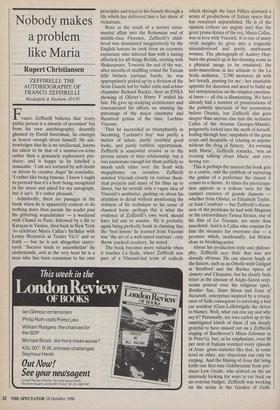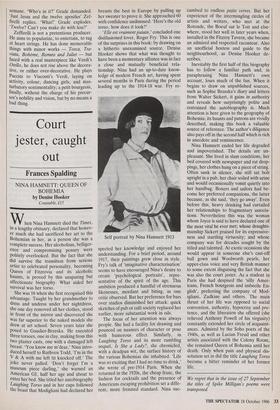Nobody makes a problem like Maria
Rupert Christiansen
ZEFFIRELLI: THE AUTOBIOGRAPHY OF FRANCO ZEFFIRELLI Weidenfeld & Nicolson, £14.95 Franco Zeffirelli believes that 'every public person is a miracle of invention' but from his own autobiography, decently ghosted by David Sweetman, he emerges as honest enough about himself. He ack- nowledges that he is no intellectual, knows his talent to be that of a metteur-en-scene rather than a genuinely exploratory pro- ducer, and is happy to be labelled a sensualist. 'I am not tortured by self-doubt or driven by creative Angst he concludes. 'I rather like being famous. I know I ought to pretend that it's a bore being recognized in the street and asked for my autograph, but it isn't. It's rather pleasant.'
Admittedly, there are passages in the book when he is apparently content to do nothing more than parade the reader past his glittering acquaintance — a weekend with Chanel in Paris, followed by a flit to Karajan in Vienna, then back to New York `to celebrate Maria Callas's birthday with Lenny Bernstein at Trader Vic's' and so forth — but he is not altogether starry- eyed. 'Success tends to anaesthetize' he understands, and at the very least he is a man who has been consistent to his own principles and loyal to his friends through a life which has delivered him a fair share of vicissitude.
Born as the result of a stormy extra- marital affair into the Bohemian end of middle-class Florence, Zeffirelli's child- hood was dominated imaginatively by the English lessons he took from an eccentric expatriate who infected him with a lasting affection for all things British, starting with Shakespeare. Towards the end of the war, after months of shuffling round the Tuscan hills betwen partisan bands, he was appropriately picked up by a division of the Scots Guards led by ballet critic and arbiter elegantiae Richard Buckle; then an ENSA showing of Olivier's Henry V sealed his fate. He gave up studying architecture and concentrated his efforts on winning the patronage of the major cinematic and theatrical genius of the time, Luchino Visconti.
That he succeeded so triumphantly in becoming `Luchino's boy' was partly a matter of talent, partly youthful good looks, and partly ruthless opportunism. Zeffirelli is somewhat evasive as to the precise nature of their relationship, but it was passionate enough for them publicly to smash each other over the head with megaphones on occasion. Zeffirelli assisted Visconti closely on various theat- rical projects and many of his films up to Senso, but he reveals only a vague idea of Visconti's aesthetics, gushing on about his attention to detail without mentioning the richness of his technique or his sense of classical form: perhaps this is what the evidence of Zeffirelli's own work should have led one to assume. He is probably again being perfectly frank in claiming that the 'best lesson' he learned from Visconti was 'the art of a well-timed tantrum': only throw cracked crockery, he noted.
The book becomes more valuable when it reaches La Scala, where Zeffirelli was part of a Visconti-led team of radicals which through the later Fifties spawned a series of productions of Italian opera that has remained unparalleled. He is of the opinion (others are angrily not) that the great prima donna of the era, Maria Callas, was in love with Visconti. It is one of many vivid insights he gives into a tragically misunderstood and pretty unpleasant woman. The photograph of Audrey Hep- burn she pinned up in her dressing room as a physical image to be emulated; the sado-masochism in her attitude to the La Scala audience, '2,500 monsters all with hot breath, panting for me'; her insatiable appetite for direction and need to build up her interpretation on the simplest emotion- al bases — all this is illuminating. We have already had a number of presentations of the pathetic spectacle of her prostration before Onassis, but Zeffirelli also goes deeper than anyone else into the reclusive Callas of the Avenue Georges-Mandel, poignantly locked into the myth of herself, leafing through fans' snapshots of the great years and incapable of relating to anyone without the drug of flattery. 'An evening with Maria', Zeffirelli remarks, 'was an evening talking about Maria' and very boring too.
This is perhaps the nearest the book gets to a centre, and the problem of nurturing the genius of a performer the closest it comes to a theme. At times the preoccupa- tion appears as a tedious taste for the camper excesses of grande damerie — whether from Olivier, or Elizabeth Taylor, or Joan Crawford — but Zeffirelli's discus- sion of the problems he had with Magnani or the extraordinary Teresa Stratas, star of his film of La Traviata, are more than anecdotal. And it is Callas who remains for him the measure for everyone else — a pressure which, incidentally, led Stratas close to breaking-point.
About his production style and philoso- phy, Zeffirelli says little that was not already obvious. He can almost laugh at the fiascos, such as an Othello with Gielgud at Stratford and the Barber opera of Antony and Cleopatra, but he clearly feels bitter at the amount of Anglo-Saxon scep- ticism poured over his religious epics, Brother Sun, Sister Moon and Jesus of Nazareth, enterprises inspired by a resurg- ence of faith consequent to surviving a bad car accident (Gina Lollobrigida the driver to blame). Well, what can one say and why say it? Personally, my toes curled up at the unmitigated kitsch of them (I am deeply grateful to have missed out on a Zeffirelli staging of Beethoven's Missa Solemnis in St Peter's), but, as he emphasizes, over 80 per cent of Italians watched every episode of Jesus: given statistics like that, at some level or other, any objections can only be carping. And the filming of Jesus did bring forth one first-rate Goldwynism from pro- ducer Lew Grade, who arrived on the set anxiously looking for ways to cut back on an overrun budget. Zeffirelli was working on the scene in the Garden of Geth- semane. 'Who's in it?' Grade demanded. 'Just Jesus and the twelve apostles' Zef- firelli replies. 'What!' Grade explodes. 'Twelve? Can't you make do with less?'
Zeffirelli is not a pretentious producer. He aims to popularize, to entertain, to tug at heart strings. He has done memorable things with minor works — Tosca, Tra- viata, Boheme, Romeo and Juliet — but faced with a real masterpiece like Verdi's Otello, he does not rise above the decora- tive, or rather over-decorative. He plays Puccini to Visconti's Verdi, laying on activity, colour, dancing girls, and mas- turbatory sentimentality; a petit bourgeois, finally, without the charge of his precur- sor's nobility and vision, but by no means a bad thing.



















































 Previous page
Previous page